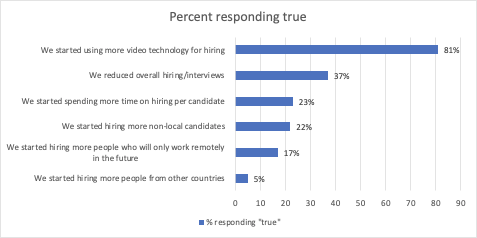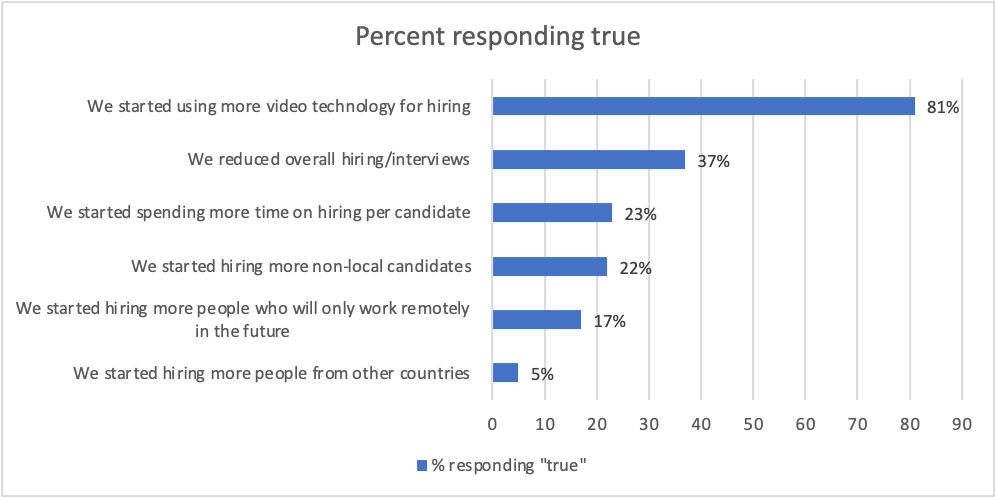Major Finding Five: The pandemic changed the way organizations hire.
- Most organizations are using more video technology for hiring (81%).
- Two-fifths (37%) indicate they reduced the time spent on the hiring/interview process while 23% indicate they spent more time.
- Organizations are expanding their candidate pool: 22% indicate that they have started hiring more non-local candidates, and another 17% say that they have started hiring more people who will only work remotely in the future.
Compared with one year ago, 36% of respondents indicate they’re doing more, or much more, hiring—only about 25% are doing less.
While there is certainly a wide range of companies and jobs impacted negatively since the pandemic emerged in early 2020, others have seen a boost in demand. According to FlexJob’s analysis, some of the positions in top demand include mental and physical therapy, mortgage and real estate, nursing, and online teaching. The once hard-hit travel and hospitality industry has also bounced back due to reopening and consumer pent-up demand for social interactions.
Many companies continued to recruit, interview, hire, and onboard employees during the pandemic—in some cases virtually, in others in-person. As they did, though, they faced a number of changes that are likely to proliferate long past the pandemic.
One big change—an uptick in the use of video technology for hiring.
Most organizations are using more video technology for hiring.
It comes as no surprise that the use of video to conduct job interviews spiked significantly in 2020. In fact, 81% of our respondents said they started using more video technology for hiring because of the COVID-19 pandemic.
This is, by far, the greatest shift in hiring trends caused by the pandemic as the chart below shows.
Survey Question: In your organization, how did recruitment trends change as a result of the Covid-19 pandemic?

Note: This excludes those who responded, “Don’t know.”
Casting a wider net.
Another way that the pandemic has changed the way that organizations are hiring relates to the emerging recognition among employers that they no longer need to be tethered to a local market for candidates. About one-fifth of respondents indicated that they have started to hire more non-local candidates (22%)—5% say they’re hiring more people from other countries. In addition, 17% say that they have started to hire more people who will only work remotely in the future.
These shifts represent some interesting opportunities for organizations to gain access to talent that they might not have previously been able to engage.
Nearly half indicate they are having issues with onboarding at least sometimes.
Onboarding is an important part of the hiring process and that, too, has experienced some significant changes during the pandemic. Nearly half of respondents say that their organization has experienced delays or other issues with the onboarding process, with 13% of participants saying “yes” and another 32% saying “sometimes.”
There are many issues during the onboarding process, especially in a remote work setting, that can lead to issues and delays. In addition to paperwork that must be completed, new employees must also be acclimated to their new roles and introduced to those they will be working with, and for.
It’s interesting to note that, generally speaking, large organizations more often experience onboarding issues, with 63% saying they have problems at least sometimes. Smaller (31%) and mid-sized (40%) organizations report fewer issues overall.
The filling out of paperwork can certainly create delays, especially when these processes aren’t automated. And, surprisingly, many companies are failing to automate their onboarding processes or use electronic signatures.
Survey Question: How do new hires at your organization fill out paperwork for and during the onboarding process? (select all that apply)
Our research found that many organizations are having issues with their onboarding process because many companies rely on manual processes. Organizations can achieve more efficiencies—and improve the new hire experience—by considering the transition of paperwork to an online, digital environment so it is easier for remote workers to access and return.
In our next post we take a look at our sixth major finding: the pandemic made background checking more challenging.



